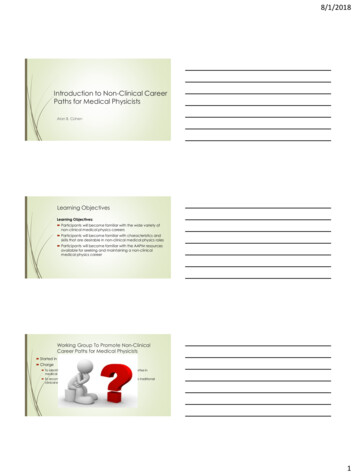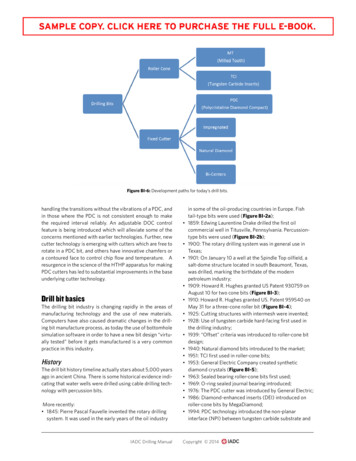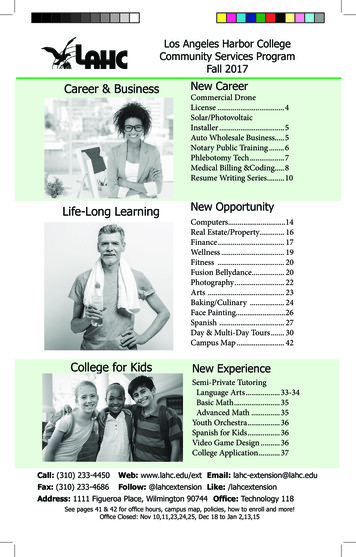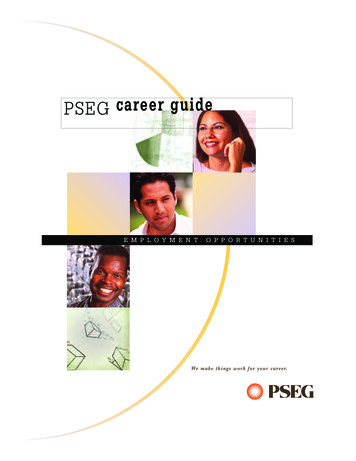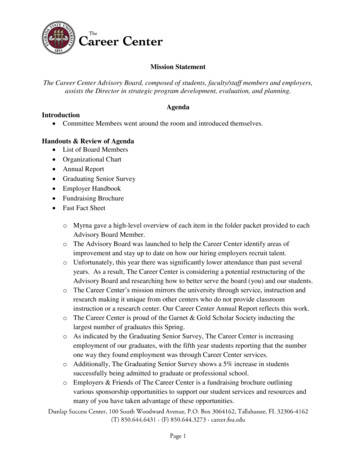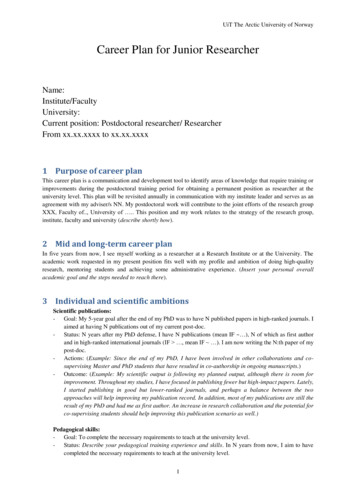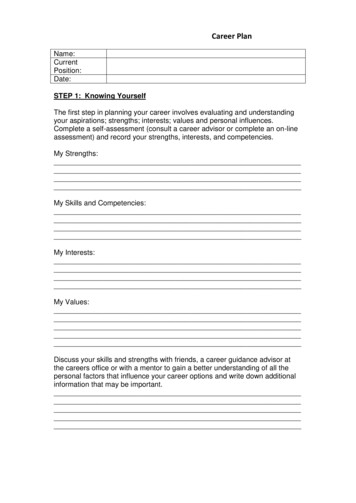
Transcription
10 Career Paths for PhDsAn ebook to help you explore options outside academiaand identify your transferable skills
2Tweet this ebook, share on Facebook, LinkedIn or Google www.jobs.ac.uk 10 Career Paths for PhDsIntroductionAre you a PhD or early career researcher thinking aheadto a career move outside of academia?Are you about to start a PhD and want to know the typesof job opportunities open to researchers?The good news is that for a variety of job roles and career routes the skillsand expertise of a researcher are in demand. This e-book will help you to useyour research skills and experience to stand out in the job market and to takesteps to secure a job. Articles and case studies will bring to life how to makethe transition from academia to alternative career paths.10 career options will be explored to highlight the benefits and opportunitiesfor researchers from a range of disciplines. The ebook ends with activities tofocus on your personal situation and to help you develop a career strategyto secure the job you want and to build a successful career.PhD routes and pathways – generating careerideas and optionsAcademic Career– Research andTeachingAcademic subjectProfessional researcherSpecific PhD researchClare Jones, Senior Careers Adviser Research Staff/Postgraduate Research StudentsContentsThis ebook builds on content from the popular jobs.ac.uk ebookCareer Planning for PhDs and covers: Using research skills in jobs outsideacademia (including activity)PhDOptions Using ProfessionalExperience and skills“Making decisions about your post PhD career is challenging and it can betempting to focus your decision making on finding a job. This can mean thatyou miss opportunities to explore a greater range of possible career options.The graphic, “PhD Routes and Pathways” is intended to offer a number of“triggers” for a wider review of possible options, for example do you wantto explore using a particular experience or skill, such as communicatingyour research, as the starting point, or could you also explore options usingyour generic research experience and skills? This ebook mainly focuses onthe middle strand of the diagram but remember that you can also make acomplete change and move into careers unrelated to your PhD or academicbackground. You can also explore options that could enable you to remainin academia but in roles other than research.”Total changeCareer unrelated to PhDand/or academic backgroundUsing genericemployability skillsBroadly speaking PhD and early career researchers build their career with afocus on one of the key routes illustrated in this PhD Career Paths diagram.Increasingly researchers adopt a portfolio approach throughout their career,building up expertise and experience in all three strands at various stages intheir working lives. Whilst the focus of this ebook is on this middle strand weencourage you to reflect on this broader context.Clare Jones, Senior Careers Adviser at University of Nottingham uses thisdiagram as a way to broaden the horizons of the researchers she works with,helping them to reflect on where they fit and as a starting point to consideroptions outside of academia. T ranslating your skills from academiato business Moving out of academia - casestudies10 alternative career paths:1. Industrial research and development2. Pharmaceutical industry3. Engineering industry4. Central government5. Research councils6. Research roles within the NHS7. Medical communications8. Charity and voluntary sector9. Finance10. Consultancy ctivity: Working in other sectors - 5Atips to help you make the right movefor you A ctivity : Using your research skills tosucceed in job market - 5 key steps A pplying for jobs - a summary ofthe key points3
4Tweet this ebook, share on Facebook, LinkedIn or Google www.jobs.ac.uk 10 Career Paths for PhDsUsing research skills in jobs outside academiaSo you enjoy research. But you are unsure if an academic career is right for you.How else can you use your research skills?You may find a research post outside academia that uses the full range of your skills –perhaps in a biotech start-up or social policy ‘think tank’. But these opportunities arerare, so do consider alternatives.A good first step is to identify your strongest skills and those you most enjoy using.So find or make a skills list – the headings here are just examples but a good placeto start, you can add a couple of your own ideas at the end or of course write yourown list. Give yourself a mark out of ten firstly for your strength (10 strongest) in thatskill and secondly for the enjoyment you derive when using it (10 most enjoyable).SkillLiterature reviewing – finding, reading &analysing complex documentsStrength ScoreEnjoyment ScoreMost of us will have a pattern of stronger and weaker skills, and a separate pattern ofthose we enjoy more and those we enjoy less. With a bit of luck we can find a match.So think most about finding a career which values the skills you are strong in and thatyou enjoy using. Here are some examples.Literature reviewingFinding, reading & analysing complex documentsVery few jobs outside academia require the high-level literature reviewing skillsdeveloped during postgraduate study. But working in many areas of central orlocal government, or in those sectors – such as health or housing – that dependon government policies for their income, requires people to be able to ‘readbetween the lines’ of policy documents and to understand the thinking behindthe development of such policies.Qualitative researchGetting information from interviews and/or focus groupsDeveloping an international perspective working with overseas colleaguesThose who enjoy qualitative research – often finding information frominterviewing people - have a huge range of job opportunities. Many jobs, suchas sales, market research, and product development, will need people to find outinformation from customers – and not just ‘Would you like fries with that?’. Thosenot in front-line roles will still have so-called ‘internal customers’ – people in otherparts of the organization who depend on their work, and will help to define whatis required.Writing - conference papers, progress reports,newsletter articles, the thesis itselfNowadays even in roles such as computing or finance, not previously associatedwith ‘people skills’, there is increasing awareness of the value of such skills.Qualitative research - getting information frominterviews and/or focus groupsQuantitative research - finding patterns,correlations and causal relationships in dataOral communications - to large audiences, tosmall-groups or just chatting about your workto non-specialists5Quantitative researchFinding patterns, correlations and causal relationships in dataIf your strengths and interests lie in working with data, think how your skills can beused in different sectors. Particle physicists are good at filtering large amounts ofdata to find small numbers of significant events, perhaps in searching for the Higgsboson. These skills could be useful in the analysis of seismic data for oil companies,financial data for banks, or patient data in the NHS, to spot patterns of successes andfailures in patient care.Similar data skills could be used in government to answer questions of economicand social policy, such as ‘Do changes in housing benefit mainly affect poor tenantsor wealthy landlords?’ The answers are not easy to find – and those with the skills tofind significant patterns in complex data are much needed in these areas.
6www.jobs.ac.uk 10 Career Paths for PhDsDeveloping an international perspectiveWorking with overseas colleaguesMany researchers have the chance to work on international projects during theirPhD or postdoctoral research. Such experience can be useful outside academia.Too many UK-based organisations have little awareness of the world outside theUK, and a graduate who can add information on how things are done in othercountries can add value, making these employers more open to different ideasand more successful.WritingTweet this ebook, share on Facebook, LinkedIn or Google Oral communicationsTo large audiences, to small-groups or just chatting about your work tonon-specialistsIf you enjoy speaking more than writing, the good news is that jobs requiringthe ability to talk confidently in front of colleagues and/or customers arewidespread. Most large employers will also provide training in public speaking– do take advantage of such training if it is offered.So if you want a change from academia, do think about your research skills,strengths and weaknesses, and your likes and dislikes. Bring these outin your job applications and interviews, and your research skills will finda suitable home.Conference papers, progress reports, newsletter articles, the thesis itselfPerhaps the most enjoyable part of your research is the writing? Very few jobsoutside academia require thesis-length written work. But many will requireproposals for new projects, bids for funding, and progress reports, so the abilityto write clearly and concisely will be useful.In many jobs there are also chances to write conference papers or journalarticles. These may not be as formal or rigorously-referenced as academicpapers, but they do help to make your reputation in the business sector. It isalso useful to have a few publications on your CV in case you decide to return toacademic life in the future.7Author: Nigel PeacockWhen I am discussing career options withPhDs it can be surprising to find that theydo not recognise the professional andgeneric skills they have acquired. They maynot often describe themselves as problemsolvers, analytical and critical thinkers yetthey employ these skills as a fundamentalpart of their work and could continue touse them in a future career or job. To add tothe problem opportunities using these skillsmay have many and varied job titles and notinclude the word “researcher”. I would adviseall PhDs to step back from the specific topicof their research and consider all the skillsand experiences they use in their work. Theycan then use this knowledge in a job searchand consider opportunities which will utilisethese skills and experiences.Clare Jones, Senior Careers Adviser Research Staff/Postgraduate Research Students
8www.jobs.ac.uk 10 Career Paths for PhDsTranslating your skills fromacademia into businessHave you ever considered taking your academic and research skillsinto the world of business? You may be seeking a fresh challenge orsimply want to enjoy a second income.Academia and business may seem poles apart but you may besurprised at how portable your skills are.Subject expertiseWell-trodden routes include:Research for external bodiesT his may be for privately owned foundations or for businessorganisations. Roles in industry are more numerous forscientists and engineers, but there are also many possibilities inquantitative subjects (in finance and consulting) and in socialsciences (for example in thinktanks and market/ social research)as well as pockets of opportunity in the arts.Consultancy pportunities in the commercial world vary depending onOsubject .You may be able to offer consulting services direct toorganisations in your field or via commercial consultancies.Other potential areas to apply subject knowledge are: A cademic Publishing (including writing school andundergraduate textbooks) E xternal Examination setting and Assessment (for professionalbodies as well as academic boards)Journalism (both print and online)Private Tutoring for individuals and groups and Guest Lecturing.Tweet this ebook, share on Facebook, LinkedIn or Google Teaching skillsTeaching and public speaking skills can transfer into training anddevelopment roles in private business beyond your subject area.Your skillset may include:Designing, preparing and delivering lecturesDesigning e-learning modulesFacilitating small group seminarsAddressing peers at conferencesOne to one tuition and coachingProviding feedback and assessment.Roles in organisations and training consultancies may include;Delivering training and lecturesI dentifying training needs for individuals and groups Designingtraining interventions involving external suppliers.Interpersonal skillsAlong with the communications skills learnt in a teachingenvironment you may have developed:I nfluencing and negotiating skills (from writing funding bids,securing resources from within your department etc.) reating and presenting ideas (in your teaching, or to draw inCexternal funding)Team working Mentoring and coaching (of early career lecturers andPhDs/post docs).9
10www.jobs.ac.uk 10 Career Paths for PhDsManagement skillsThis may be an increasingly large part of your role involving:Project ManagementLine Management (hiring, developing, motivating andassessing performance)Financial and resource managementMarketing (e.g. student recruitment).These skills are in great demand in business in areas as diverse assales, management consulting, human resources, public relations,facilities management, procurement and so on.A quick search of the jobs.ac.uk jobs listings brought up:A health consultancy advertising for a medical writerA chain of private colleges recruiting an Education LiaisonExecutive for schoolsA food manufacturer needing a New ProductDevelopment TechnologistA hedge fund with opportunities in scientific/financial research.Refine your search by seeking ‘Commercial Organisations’ in‘Employer Type’ and make sure you sign up for email alerts.Author: Lisa CarrTweet this ebook, share on Facebook, LinkedIn or Google Moving out of academia - Case studyDr Lydia Harriss - Welcome TrustDr Lydia Harriss took up a post in a non-lab basedrole at the Wellcome Trust after completingher PhD at the Life Science Interface DoctoralTraining Centre at the University of Oxford.“I knew from my research and extracurricularactivities, that there were certain skills I reallyenjoyed and wanted to continue using, sucha
10 alternative career paths: 1. Industrial research and development 2. Pharmaceutical industry 3. Engineering industry 4. Central government 5. Research councils 6. Research roles within the NHS 7. Medical communications 8. Charity and voluntary sector 9. Finance 10. Consultancy ctivity: Working in other sectors - 5 A tips to help you make the right move for you Options Using Professional .
